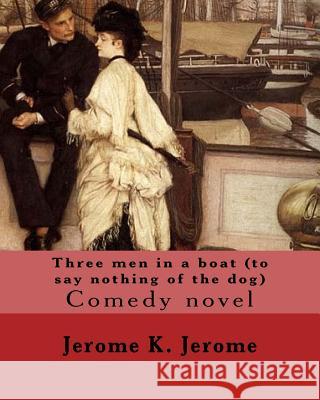Three men in a boat (to say nothing of the dog) By: Jerome K. Jerome: Comedy novel » książka
Three men in a boat (to say nothing of the dog) By: Jerome K. Jerome: Comedy novel
ISBN-13: 9781543282375 / Angielski / Miękka / 2017 / 108 str.
Three men in a boat (to say nothing of the dog) By: Jerome K. Jerome: Comedy novel
ISBN-13: 9781543282375 / Angielski / Miękka / 2017 / 108 str.
(netto: 38,50 VAT: 5%)
Najniższa cena z 30 dni: 38,17 zł
ok. 13-18 dni roboczych.
Darmowa dostawa!
Three Men in a Boat (To Say Nothing of the Dog), published in 1889, is a humorous account by English writer Jerome K. Jerome of a two-week boating holiday on the Thames from Kingston upon Thames to Oxford and back to Kingston. The book was initially intended to be a serious travel guide, with accounts of local history along the route, but the humorous elements took over to the point where the serious and somewhat sentimental passages seem a distraction to the comic novel. One of the most praised things about Three Men in a Boat is how undated it appears to modern readers - the jokes seem fresh and witty even today. 2] The three men are based on Jerome himself (the narrator Jerome K. Jerome) and two real-life friends, George Wingrave (who would become a senior manager at Barclays Bank) and Carl Hentschel (the founder of a London printing business, called Harris in the book), with whom Jerome often took boating trips. The dog, Montmorency, is entirely fictional but, "as Jerome admits, developed out of that area of inner consciousness which, in all Englishmen, contains an element of the dog." The trip is a typical boating holiday of the time in a Thames camping skiff.This was just after commercial boat traffic on the Upper Thames had died out, replaced by the 1880s craze for boating as a leisure activity.Following the overwhelming success of Three Men in a Boat, Jerome later published a sequel, about a cycling tour in Germany, titled Three Men on the Bummel (also known as Three Men on Wheels, 1900). The story begins by introducing George, Harris, Jerome (always referred to as "J."), and Jerome's dog, a fox terrier called Montmorency. The men are spending an evening in J.'s room, smoking and discussing illnesses from which they fancy they suffer. They conclude that they are all suffering from "overwork" and need a holiday. A stay in the country and a sea trip are both considered. The country stay is rejected because Harris claims that it would be dull, the sea-trip after J. describes bad experiences of his brother-in-law and a friend on sea trips. The three eventually decide on a boating holiday up the River Thames, from Kingston upon Thames to Oxford, during which they will camp, notwithstanding more of J.'s anecdotes about previous mishaps with tents and camping stoves. They set off the following Saturday. George must go to work that day, so J. and Harris make their way to Kingston by train. They cannot find the right train at Waterloo station (the station's confusing layout was a well-known theme of Victorian comedy) so they bribe a train driver to take his train to Kingston, where they collect the hired boat and start the journey. They meet George further up river at Weybridge. The remainder of the story describes their river journey and the incidents that occur. The book's original purpose as a guidebook is apparent as J., the narrator, describes passing landmarks and villages such as Hampton Court Palace, Hampton Church, Magna Carta Island and Monkey Island, and muses on historical associations of these places. However, he frequently digresses into humorous anecdotes that range from the unreliability of barometers for weather forecasting to the difficulties encountered when learning to play the Scottish bagpipes. The most frequent topics of J.'s anecdotes are river pastimes such as fishing and boating and the difficulties they present to the inexperienced and unwary and to the three men on previous boating trips.... Jerome Klapka Jerome (2 May 1859 - 14 June 1927) was an English writer and humourist, best known for the comic travelogue Three Men in a Boat (1887).











